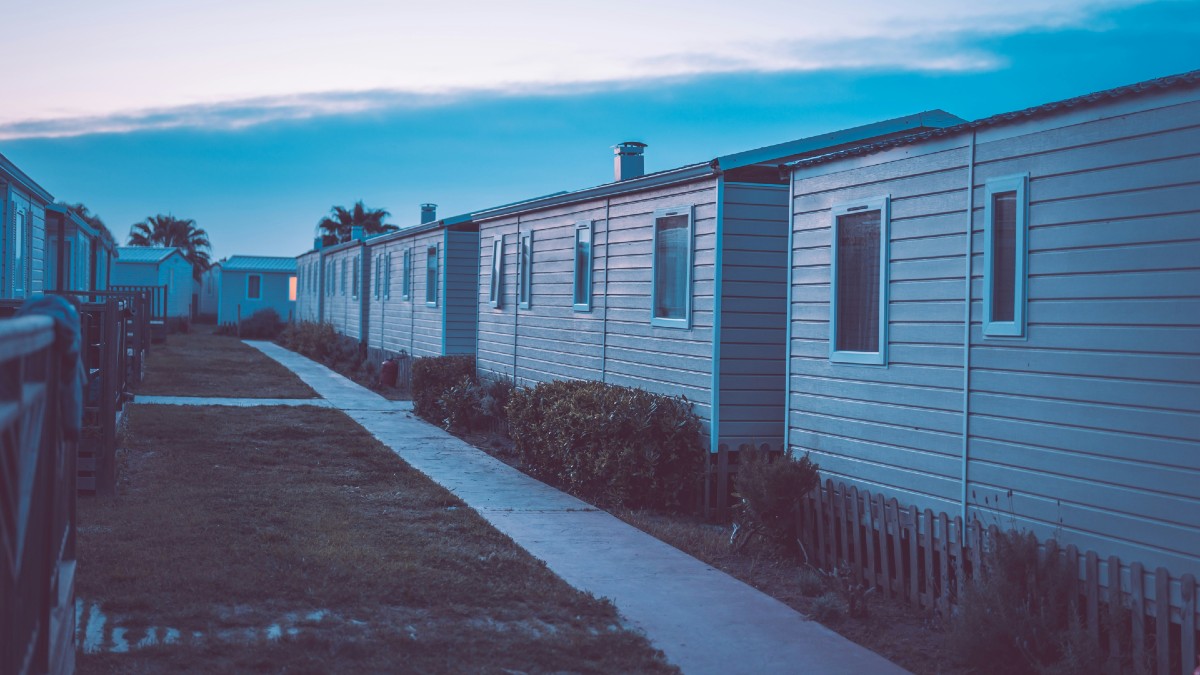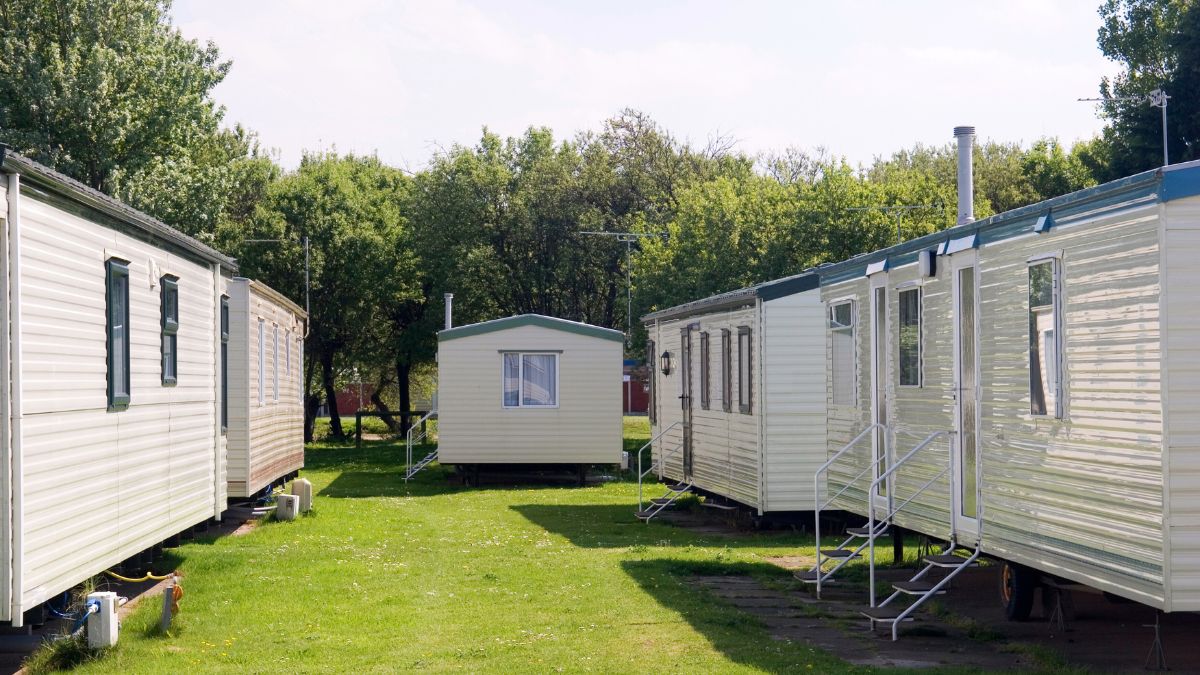Buying a cabin in a holiday or caravan park isn't exactly a mainstream choice, but it does have its appeal - especially for retirees who want a budget-friendly, relaxed lifestyle. With lower price tags than traditional homes and prime locations near the beach or bush, it's easy to see why it might catch your eye.
But before you dive in, it's worth taking a closer look. From tricky ownership rules to ongoing costs, there's more than initially meets the eye. Here's what to consider before making the leap.
What are onsite cabins?
Caravan parks are a mix of temporary and permanent living spaces, catering to short-term visitors and long-term residents. Tourist sites are typically reserved for towable caravans and camper trailers, while annual sites are home to more permanent setups like onsite caravans and cabins.
Onsite cabins are basically the no-fuss version of a holiday home. They're permanent structures inside caravan or holiday parks, so there's no towing, no setting up, and definitely no wrestling with tent poles. You just show up, unlock the door, and you're set.
These cabins are fully self-contained, which is a fancy way of saying they've got the basics covered: a kitchen to cook in, a bathroom that's all yours, and an actual bed-no air mattresses or sleeping bags in sight. Some even come with an attached outdoor veranda.
Being in a holiday park means you're usually near something nice to look at - beaches, bushland, maybe a river - and there are often shared facilities like BBQ areas or a pool.
You can also buy onsite cabins in some holiday parks, making them a more affordable option for a permanent holiday base. Some holiday parks also allow you to live in them permanently. They're often very affordable - some can start as low as $8,000 all the way to $450,000 according to Cabin Connect - making them a tempting alternative to buying a traditional property in the suburbs.

Image by Janek Valdsalu via Unsplash
Why consider buying in a holiday park?
Buying an onsite cabin in a holiday or caravan park definitely isn't a mainstream choice, so why would someone consider buying one?
For retirees, buying an onsite cabin can be an appealing and practical option, especially for those looking for an affordable, low-maintenance lifestyle. Unlike retirement villages, which often come with significant upfront costs and ongoing fees, onsite cabins are generally much more budget-friendly. In some cases, they can cost as little as $70,000, making them accessible for those looking to stretch their retirement savings further. Selling the big family home to downsize into an onsite cabin can seem like a smart financial move. The proceeds from the sale of the big family home - which would easily be hundreds of thousands of dollars, potentially millions - can not only cover the cost of the cabin outright but also leave retirees with a substantial surplus to fund their lifestyle, travel, or bolster their retirement nest egg.
The lifestyle onsite cabins offer is another major drawcard to retirees. Many of these holiday parks are located in picturesque settings - beachfronts, riverbanks, or tucked away in bushland - allowing retirees to enjoy their retirement in a serene, scenic setting. Holiday parks also offer lots of amenities like pools, BBQ areas, tennis courts, and other social hubs, which fosters a sense of community that can be particularly valuable during retirement. Onsite cabins are also easy to maintain, freeing up more time for retirees to focus on hobbies or travel.
Some holidaymakers also choose to buy onsite cabins as an affordable way to secure their own getaway spot, while renting the cabin out when they're not using it to help offset the costs. Compared to purchasing a standalone holiday home, onsite cabins come with a much smaller price tag, allowing owners to enjoy the perks of a holiday retreat without the hefty financial commitment.
Even younger buyers, including singles or couples saving for their first home, might be tempted to consider onsite cabins because they're so affordable compared with a traditional property. However, this may not be the best option in the long run as onsite cabins don't appreciate in value like traditional homes because you don't own the land - only the cabin itself.
Pros and cons of buying in a holiday park
Buying an onsite cabin in a holiday park can be a more affordable, low-maintenance alternative to traditional property ownership, but it comes with its own set of advantages and challenges.
Pros:
Affordability
Onsite cabins in caravan or holiday parks are significantly cheaper than buying a traditional property in the suburbs. Where a traditional home can be hundreds of thousands of dollars, if not millions, onsite cabins are generally in the ballpark of between $70,000 to $200,000 depending on the location, park and the type of cabin.
Low maintenance
Onsite cabins are usually located within well-maintained parks which means you don't need to worry about the upkeep of any communal areas or gardening. The park management handles the maintenance of all the shared facilities, like pools, BBQ areas and gardens. All you have to worry about is looking after your own cabin, which is often manageable due to the smaller size and simple upkeep.
Lifestyle
A big perk of buying a cabin in a holiday park is the laid-back lifestyle. These tourist parks are usually located in scenic locations - near beaches, by a river, or in bushland - so it feels like you're on a permanent holiday. Shared amenities like pools, tennis courts, BBQ areas and recreational spaces add to the appeal.
Very minimal or no stamp duty
A major perk of buying a cabin in a holiday park is that, in most cases, you don't have to pay stamp duty on it, which is a big deal when you consider how much it can add to the cost of buying a traditional property. For example, if you're buying a $650,000 property in QLD, stamp duty could set you back over $15,000.

Image by onfilm via Canva
Cons:
Financing challenges
Onsite cabins can be tricky to finance because they don't come with land ownership-just the cabin itself. Most banks won't touch properties under 40sqm, as they fall outside traditional lending criteria. Without land as security, cabins don't qualify for standard home loans, meaning you'll likely need to take out a personal loan. This can result in higher interest rates and shorter repayment terms, which might make the affordability less appealing for those planning to finance the cabin rather than buy outright.
Depreciating asset
Given you're only purchasing the structure itself, you're unlikely to experience value gains like traditional property tied to land. In fact, cabins are treated as depreciating assets, much like vehicles or caravans, so their value tends to decline over time. Without land ownership, there's no potential for capital growth, which can limit resale options and make it harder to recover your initial investment.
Resale issues
Selling an onsite cabin can be tricky due to the limited market for these types of properties. Some holiday parks require you to sell through the park operators, who may take a commission from the sale price. On top of this, buyers may be put off by restrictions, such as park rules or lease terms, making it harder to find a buyer and increasing the likelihood of selling at a loss.
Park operator control
When you buy an onsite cabin, you're signing up to play by the park's rules, and those rules can change at any time. Park operators have the power to adjust policies, increase fees, or even sell the land your cabin sits on.
Restrictions
If the park has a holiday-use agreement in place, you might not be able to live in your cabin full-time. These agreements often limit how much time you can spend there consecutively or annually, as the park is technically designated for holiday use. If you're considering an onsite cabin as your permanent residence, it's important to check the park's specific rules and regulations.
Ongoing fees
You'll typically need to pay site fees to the park operator. These fees cover your lease of the land and the maintenance of shared facilities like pools, BBQ areas, and gardens. Such fees can vary widely, typically ranging from $2,500 to over $15,000 per year according to Cabin Connect.
Uncertain stability
The land under a cabin is rented from the park owner under a 12-month occupation agreement. Park owners can reclaim the site at the end of the agreement or if it's breached. While rare, parks may convert annual sites back into tourist sites, requiring you to vacate and remove your cabin or van.
Transient environment
Because most people who visit holiday parks are tourists, many of your neighbours will be temporary and because they're on holidays, could be noisy.
Insurance challenges
Insuring an onsite cabin can be tricky, as many traditional insurers don't cover non-standard properties like these. You may need to find a specialist insurer familiar with onsite cabins.
Vulnerable to park decisions
If a park closes or changes hands, you may face uncertainty about your cabin's future.
Financing an onsite cabin
Getting finance for an onsite cabin can be much harder than securing a loan for a standard home because onsite cabins don't come with land ownership, which makes them a bit of a headache for most lenders.
Banks typically want land as security, or at least meet certain criteria like a minimum size of 40sqm. Onsite cabins, which can be as small as 20sqm, don't check those boxes, meaning they usually miss out on traditional home loan options.
The land lease agreement with the holiday park adds another complication. Short-term or renewable leases are often seen as a higher risk, and because onsite cabins are depreciating assets, it can make lenders even more hesitant to offer you a loan.
If you can't get traditional finance, be prepared for a larger upfront payment or look into specialist lenders. Just keep in mind, these lenders often charge higher interest rates, stricter repayment terms, and may even require specific cabin insurance to cover the risk.
Onsite cabins usually aren't eligible for any government schemes like first-home buyer grants or stamp duty discounts either.
So, without land as collateral for the loan, you're left with personal loans or niche lenders who focus on holiday park properties - unless you have the cash to purchase outright.
Couran Cove - a cautionary tale
When it comes to onsite cabins, Couran Cove on South Stradbroke Island serves as a cautionary tale of what can go wrong when buying into a holiday park. Couran Cove was once a popular resort destination, but its fortunes have taken a drastic turn due to a series of legal and operational challenges.
The resort has been embroiled in multiple legal disputes over unpaid fees, with service providers claiming the bodies corporate owe them more than $25 million. This ongoing financial strife reached a breaking point in 2023, leading to a serious disruption of essential services. In February 2023, residents at Couran Cove were left without electricity, water, and sewerage after these essential services were cut off due to the unresolved payment issues. In April 2023, these services remained disconnected. In response to mounting difficulties, the resort operator abandoned the property in 2023, further exacerbating the situation.
Property values at the resort have plummeted, with some waterfront cabins and villas that were originally worth a couple of hundred thousand selling for as little as $50,000. As a result, owners have been forced to sell - or at least try to sell - their properties at a loss. Owners who have been unable to sell their properties and have nowhere else to go have been forced to remain there using backup generators for power, and bring in their own bottled water.
What's more, real estate agents appointed to try and offload these properties exploited a loophole by continuing to advertise properties at Couran Cove without disclosing that essential services, like water and electricity, had been disconnected.
The downfall of Couran Cove is a stark reminder that when buying into a resort or holiday park, it's important to thoroughly investigate the financial stability, legal standing, and long-term viability of the park. While an onsite cabin might seem like an affordable and attractive option at first glance, the land lease, park rules, and overall park management can have a massive impact on your investment. Buying an onsite cabin can be risky, so proceed with caution, do extensive research, and understand that it's not the right choice for everyone.

Ready, Set, Buy!
Learn everything you need to know about buying property – from choosing the right property and home loan, to the purchasing process, tips to save money and more!
With bonus Q&A sheet and Crossword!



 Harry O'Sullivan
Harry O'Sullivan

 Denise Raward
Denise Raward
 Rachel Horan
Rachel Horan
 Jacob Cocciolone
Jacob Cocciolone

